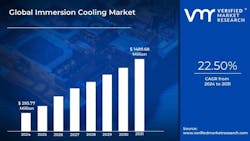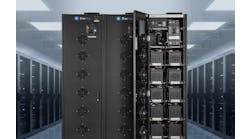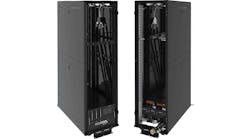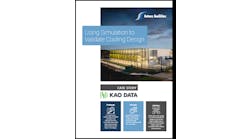Turn Up the Volume: Data Center Liquid Immersion Cooling Advancements Fill 2024
If 2023 marked the data center industry's "summer of AI" with regard to market and technology advancements, it definitely now makes sense to think in terms of this year's "summer of liquid cooling." As empirically confirmed from zeitgeist absorbed at annual industry events Data Center World and 7x24 Exchange, the clarion call for such a contention may have come this Spring with the March launch of the Liquid Cooling Coalition (LCC).
According to the LCC's launch announcement, the coalition's mission is "to promote the widespread adoption of liquid cooling solutions for information and communications technology equipment in data centers and beyond. Guided by a clear vision of an environmentally sustainable digital world, the coalition pledges to educate policymakers and the public, advocate for supportive policies, and foster collaboration among industry stakeholders," adds the announcement.
Along with the LCC's stated intention to pioneer sustainability in data centers, the coalition's Executive Director Erica Thomas, formerly a director of Green Grid, told DCF that the group's goal is to foster the entire ecosystem of data center liquid cooling technology across a diverse array of stakeholders. Such players include industrial coolant producers, original equipment manufacturers, original device manufacturers, high-performance computing application operators, and data center providers.
By championing liquid cooling technology solutions in data centers, Thomas said the coalition seeks to significantly reduce the industry's resource consumption, minimizing its environmental impact while enhancing the efficiency and resilience of digital infrastructure.
As further explained by the LCC's launch announcement, "In the age of the Artificial Intelligence (AI) revolution, liquid cooling is necessary to unlock the full potential of highly efficient and sustainable information and communications equipment. By advocating for innovative policy solutions and promoting education and awareness initiatives, the LCC aims to accelerate the adoption of liquid cooling technologies globally."
LCC founding member companies include Ada Infrastructure, ENEOS, Intel, Submer, Shell, Supermicro, Wyoming Hyperscale White Box, and Vertiv.
A Year for Data Center Liquid Immersion Cooling Technology Advancements
This February, we noted how immersion cooling technology, long a niche player, this year seemed poised to claim a greater share of center the data center industry's center stage. Data released this month by industry analyst Verified Market Research (VMR) confirms this prior impression.
The latest report by VMR (who keeps multiple global headquarters in Lewes, Delaware, Pune, India, and Dubai, UAE) forecasts the global immersion cooling market to grow at a CAGR of 22.50% from 2024 to 2031.
VMR's report further states that the market was valued at USD $293.77 million in 2024, and is expected to reach approximately USD $1.49 billion by the end of the forecast period.
Key players in the global immersion cooling market for data centers as identified by VMR include: LiquidStack; Fujitsu; Green Revolution Cooling (GRC); Submer; Asperitas; Midas Green Technologies; Iceotope Technologies; LiquidCool Solutions; DUG Technology, and DCX. Other cornerstone players in the space include CoolIT Systems, Motivair and Boyd, which are the three largest liquid cooling companies, according to Dell’Oro.
The researcher sees the immersion cooling market being driven by increasing data center power densities, rising demand for efficient thermal management solutions, and advancements in high-performance computing (HPC).
However, market growth is seen as somewhat restrained by high initial costs, complex implementation processes, and a lack of standardized solutions. Additionally, concerns over coolant fluid compatibility and environmental impact are cited as challenges.
Despite these restraints, ongoing technological innovations and a growing awareness of the technology's significant energy efficiency benefits are expected to propel the market's expansion, according to VMR.
Liquid Immersion Cooling On the Move
Conspicuously encased in the aforementioned list of LCC founding members are three companies representing how much data center immersion cooling developments in particular are propelling the year's overall liquid cooling technology momentum: Intel, Submer and Shell.
Intel and Submer
Despite current headwinds, it seems like Intel is playing the long game when it comes to liquid-cooled AI servers. As far back as 2022, Intel declared that "the time is now" for immersion cooling in announcing it would partner with the Open Compute Project and cooling vendors to develop standards to make data center liquid immersion technology more accessible. Word of the company's OCP partnership followed on the heels of several key developments.
In January 2022, Intel announced an agreement with GRC to design and implement customized immersion cooling techniques in future data centers and edge deployments. Also in 2022, Intel delivered an industry-first immersion warranty rider for its Xeon processors, and won its first sustainability deals with large global customers, including Microsoft and Alibaba.
Harkening further back to 2021, Intel announced a key collaboration with leading immersion cooling specialist Submer (Barcelona) to work on Submer-cooled Intel Xeon processors in data centers.
Intel's formative immersion cooling agreement with Submer augmented that company's stated ambition to rethink the medium used for cooling in data centers to prominently feature immersion cooling as a promising solution that can meet the challenges posed by high-density components and increasing TDP.
News from last October's annual OCP Global Summit that Intel and Submer had perfected a milestone Forced Convection Heat Sink (FCHS) package for single-phase immersion cooling of data center chips above 1000W TDP codified such ambitions.
“Many have challenged the technological runway of single-phase immersion cooling," remarked Daniel Pope, co-founder and CEO of Submer. "The FCHS is the undeniable proof that immersion is here to compete head-on with other liquid cooling technologies, including direct liquid cooled water-based cold plates."
This March, global data center developer Solvenz unveiled plans for a partnership with Hypertec, JLL and Submer. Solvenz plans to develop three state-of-the-art data centers with a critical IT load of 465 MW, engineered to meet HPC demands for AI and ML data processing workloads.
Hypertec, Solvenz’s data center architect and builder, recently announced the completion of an upgrade to host one of world’s largest and greenest immersion-cooled supercomputers. This supercomputer’s immersion cooling technology and Hypertec’s Trident line of immersion-born servers form the foundation for the eco-friendly HPC cooling technology that Solvenz will look to deploy in its data centers, with commercial real estate firm JLL scouting locations in the deal.
Crucially, Solvenz will employ Submer’s SmartPod platform for single-phase immersion cooling technology capable of supporting 140 kW per rack. In contrast to the global average Power Usage Effectiveness (PUE), which typically ranges between 1.6 and 1.9 for rack densities of just 17 kW, the Submer technology's PUE lands between 1.03 and 1.1.
In May, Submer announced yet another strategic immersion cooling partnership, this time with Dell Technologies and OEM integration partner UNICOM Engineering to deploy UNICOM servers based on Dell technology powered by Intel and NVIDIA products currently on the market.
“This partnership is harnessing the power of trusted Dell PowerEdge products, UNICOM Engineering’s extensive server design and integration expertise, and Submer’s high-efficiency and sustainable technology to pioneer immersion-cooled solutions in the market,” said Charles ‘Rusty’ Cone, General Manager at UNICOM Engineering.
Also in May, federal government technology incubator Sandia National Laboratories revealed that throughout this summer it is formally testing a commercial, nonconductive liquid immersion cooling system from Submer at the lab's High Performance Computing center.
Submer notes that its single-phase immersion cooling system uses a biodegradable, nontoxic, nonflammable and noncorrosive liquid, which the company boasts as being 95% more efficient than traditional cooling technologies, while 1,400 times a better thermal conductor than air and eight times less electrically conductive.
Sandia researchers said direct immersion techniques may cut power use in compute-intensive HPC-AI clusters by 70%.
Shell Lubricants
Claiming its pillar of the 3-legged stool of data center immersion cooling technology represented by the LCC's founding members' listing is oil and gas company Shell, who in 2023 introduced a range of single-phase immersion cooling fluids aimed at data centers, as produced by its Shell Lubricants business.
Made from natural gas using Shell’s gas-to-liquids (GTL) process, the company says its GTL products are synthetic, colorless, odorless fluids which are inherently biodegradable to different extents, as well as stable and bearing excellent performance and material compatibility.
This January, Shell announced its deployment of GRC immersion tanks at a data center in Houston, Texas.
Shell's place among the LCC's founding members illustrates the emphasis coalition Executive Director Thomas places upon her group's support for the entire technology ecosystem for liquid cooling. Shell, along with oil industry counterpart ExxonMobil, who in April announced a collaboration with Intel for liquid cooling of the company's Xeon-based technology, are angling to become key providers of dielectric fluids used in immersion cooling systems.
Industry analyst VMR notes such dielectrics often include mineral oil, fluorocarbon-based fluids, and deionized water.
Meanwhile, Datacenter Dynamics last month reported that US food company Cargill has developed a plant-based immersion cooling fluid which data center startup Ultrascale Digital Infrastructure (UDI) wants to employ in immersion-cooled facilities across a waterless 52U rack design capable of cooling more than 300 kW per rack.

Matt Vincent
A B2B technology journalist and editor with more than two decades of experience, Matt Vincent is Editor in Chief of Data Center Frontier.






